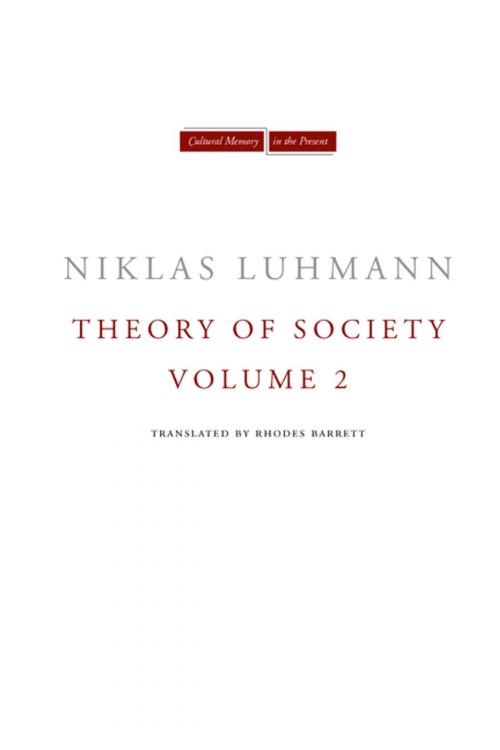| Author: | Niklas Luhmann | ISBN: | 9780804787277 |
| Publisher: | Stanford University Press | Publication: | August 21, 2013 |
| Imprint: | Stanford University Press | Language: | English |
| Author: | Niklas Luhmann |
| ISBN: | 9780804787277 |
| Publisher: | Stanford University Press |
| Publication: | August 21, 2013 |
| Imprint: | Stanford University Press |
| Language: | English |
This second volume of Niklas Luhmann's two-part final work was first published in German in 1997. The culmination of his thirty-year theoretical project to reconceptualize sociology, it offers a comprehensive description of modern society. Beginning with an account of the fluidity of meaning and the accordingly high improbability of successful communication, Luhmann analyzes a range of communicative media, including language, writing, the printing press, and electronic media, as well as "success media," such as money, power, truth, and love, all of which structure this fluidity and make communication possible. The book asks what gives rise to functionally differentiated social systems, how they evolve, and how social movements, organizations, and patterns of interaction emerge. The advent of the computer and its networks, which triggered potentially far-reaching processes of restructuring, receives particular attention. A concluding chapter on the semantics of modern society's self-description bids farewell to the outdated theoretical approaches of "old Europe"—that is, to ontological, holistic, ethical, and critical interpretations of society—and argues that concepts such as "the nation," "the subject," and "postmodernity" are vastly overrated. In their stead, "society"—long considered a suspicious term by sociologists, one open to all kinds of reification—is defined in purely operational terms. It is the always uncertain answer to the question of what comes next in all areas of communication.
This second volume of Niklas Luhmann's two-part final work was first published in German in 1997. The culmination of his thirty-year theoretical project to reconceptualize sociology, it offers a comprehensive description of modern society. Beginning with an account of the fluidity of meaning and the accordingly high improbability of successful communication, Luhmann analyzes a range of communicative media, including language, writing, the printing press, and electronic media, as well as "success media," such as money, power, truth, and love, all of which structure this fluidity and make communication possible. The book asks what gives rise to functionally differentiated social systems, how they evolve, and how social movements, organizations, and patterns of interaction emerge. The advent of the computer and its networks, which triggered potentially far-reaching processes of restructuring, receives particular attention. A concluding chapter on the semantics of modern society's self-description bids farewell to the outdated theoretical approaches of "old Europe"—that is, to ontological, holistic, ethical, and critical interpretations of society—and argues that concepts such as "the nation," "the subject," and "postmodernity" are vastly overrated. In their stead, "society"—long considered a suspicious term by sociologists, one open to all kinds of reification—is defined in purely operational terms. It is the always uncertain answer to the question of what comes next in all areas of communication.















